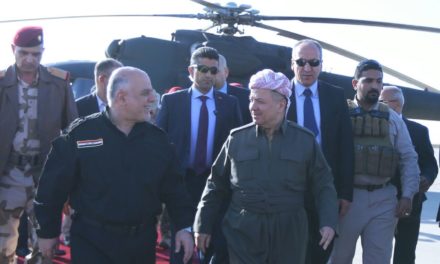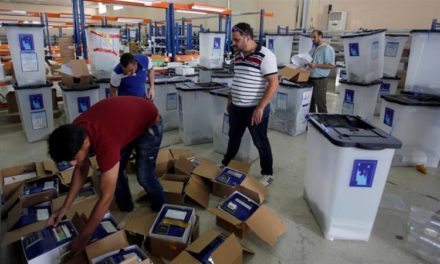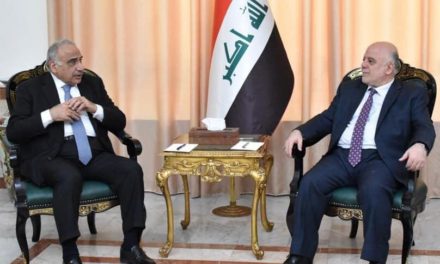(Iraqi Security Forces in possession of stacks of boxes containing drugs at Umm Qasr port in Basra. Reuters)
Life is hard, the mere act of living can often be quite exhausting for many. In Iraq as one can imagine, life is even harder than in most other places for several reasons. When life gets too much to handle, we need our favourite people and things to help us cope and keep us going: family members, friends, prayers, food, music, films, other hobbies, etc. Hussein on the other hand (not his real name), decided to enlist the help of illicit drugs.
Life was a lot to grapple with for Hussein, a 19 year old unemployed high school dropout from Southern Iraq. He felt despondent and empty most of the time. Boredom with everything and everyone around him took over. He was unhappy, unable to relax, eager to try something new that could get him out of this rut. The pressure from his family and from society was unbearable, living up to their expectations of him and keeping up with their standards were impossible. He was desperate for a solution, something that could tune everything out and make him feel like a new person.
He started to look around for a way out, and then out of the blue this resourceful, smooth-talking friend appeared in his life. He got him in a way that his own family and other friends never did. He listened to him, did not judge him, and seemed to understand his inner struggles. One day after one of their heart-to-heart conversations, he offered him something new to try out together, a magical drug that could make all of those negative feelings and emotions go away.
Hussein and his friend smoked crystal methamphetamine together via a pipe. He felt great afterwards, like he was able to take on the whole world. He was no longer an inadequate, shy kid. He liked the euphoria and the massive strength that came with it, so he asked his friend to repeat the experience over and over again. Crystal meth is cheap and available where he lives, and even though he is jobless his family gave him money whenever he requested which he spent on sustaining his new habit.
As time went by, Hussein’s condition deteriorated significantly. He was not eating, he was not sleeping, he was spending most of his time in his room, he neglected himself and his family, and he became increasingly aggressive and paranoid. Up to that point his family had no idea that he was addicted to crystal meth, but when his behaviour began to cause major problems for himself and them, they began to notice that something was seriously wrong with him. After questioning and pressuring him, Hussein confessed everything.
The Iraqi Ministry of Health offers no official statistics on substance misuse in Iraq, but published research papers authored by Iraqi psychiatrists in addition to a 2010 report by the WHO and a survey of substance misuse in Iraq by the US Department of State/Bureau of International Narcotics and Law Enforcement Affairs (2015) all indicate increasing rates of alcohol and illicit drug abuse in Iraq after 2003, especially among young, uneducated citizens who live in poor and disadvantaged areas and also among the military. Open borders, lacking security, repeated traumatic events, and civil unrest can all be credited as causative factors. The illicit substance most widely misused in Iraq remains alcohol followed by a number of subscription drugs including benzodiazepines, benzhexol, codeine, and other psychiatric medications.
Also, the rates of misuse of marijuana, tramadol (an opioid-type analgesic), and amphetamine-type substances (ATS) have increased exponentially in many areas of the country. Two types of ATS are currently available all over Iraq and especially in the South: “01 Pills” (Captagon, an amphetamine-type drug) and “crystal” (methamphetamine). The 01 Pills appear to be of the same type of ATS that is being misused in Saudi Arabia, and it seems to be entering the country via ships that are coming to Basra Province from the Gulf region. Crystal is likely coming from Iran, since drug seizures have been near the Iranian border and crystal misuse in Iran is extensive. Unavailability of alcohol in the South made other readily available and much cheaper drugs a desirable alternative for many misusers especially considering the fact that the societal stigma associated with taking illicit drugs is much less intense than that associated with drinking alcohol. Misuse of tramadol is also increasing substantially in many parts of Iraq; it is available via pharmacies and also from street drug dealers.
As expected, alcohol and drug addicts in Iraq who want to seek help to “get clean” are going to face a hard time accessing specialised services that are specifically catered to their pressing needs. There is no specialised addiction hospital anywhere in Iraq and the psychiatric care offered to addicts is mostly medical with the psychosocial aspect of their condition often neglected or not focused on enough despite its extreme importance. Ibn Rushd Teaching Hospital For Psychiatric Medicine in Baghdad does have an in-patient detoxification ward that is separate from general psychiatric wards to which misusers are admitted to be under medical supervision while they go through the critical withdrawal period as drugs exit their bodies, but the help offered to them is for the most part clinical with minimal psychosocial workup and counselling and they are discharged home as soon as acute withdrawal symptoms subside. Baghdad Teaching Hospital has an addiction outpatient clinic that is separate from the regular psychiatric outpatient clinic, but with limited resources.
Not having separate facilities for the in-patient detoxification and treatment of substance misusers in most parts of Iraq is bound to complicate the process of their recovery even further as it can often be inappropriate to manage a person going through acute withdrawal symptoms next to an acutely ill psychiatric patient. Furthermore, managing military substance misusers next to civilian ones at civilian hospitals by civilian staff members who are unfamiliar with their unique struggles is far from ideal.
Residential rehabilitation centers that offer longer-term care to addicts in need for that kind of care do not exist in Iraq. Iraq does not have private-sector facilities for in-patient detoxification and longer-term rehabilitation either. Due to the unavailability of undergraduate and postgraduate clinical psychology studies in Iraq, psychological evaluation and management of misusers is done by holders of a bachelors degree in psychology which can often negatively affect the quality of help that is being provided due to lack of proper training and qualifications. Additionally, self-help groups in which sober ex-addicts sponsor and help other addicts achieve sobriety and maintain recovery, something along the lines of Alcoholics Anonymous or Narcotics Anonymous for example, do not exist here. A lot of work needs to be done before we can see self-help culture catch on in Iraq and become a societal norm.
Substance misuse is one of the most pressing public health challenges with which Iraq has ever had to deal with post-2003. Preventing the spread of illicit drugs among Iraqis and especially the younger generation is becoming a security priority; border security is tightening and law enforcement agencies are beginning to crack down on drug-dealing gangs. The first half of 2018 has seen an uptick in major drug busts including Captagon seized in Dhi Qar sourced from the Gulf, crystal meth, heroin and other drugs seized by border police in Basra as it arrived from Iran, shipment of 7 million Artane pills seized in Baghdad International Airport from Turkey, and a massive narcotics shipment seized by armed forces as it entered Anbar province from Jordan. Iraq’s Special Forces have also conducted airdrop missions across northern Basra to combat drugs gangs and detain suspects. The State recognizes the danger of a drug epidemic and has been working on it from a law enforcement perspective, but more needs to be done at the social and healthcare level in particular to promptly address this highly urgent issue and allocate resources to manage it and prevent it from propagating further. More needs to be done to shut down dodgy pharmacies that sell drugs without a doctor’s prescription, and the State must launch effective anti-misuse propaganda campaigns directed mainly at Iraqi youth.
Back to Hussein, after he confessed to his family, they brought him to Baghdad and he was admitted to an in-patient psychiatric ward where he got the help that he needed. A week later he was discharged home by his treating psychiatrist, before he left the hospital he made a promise to the staff that he would never let crystal back into his life. “I was dead, and you brought me back to life”, he added tearfully as he said his goodbyes.

Noor Ali
Noor Ali is a resident of Baghdad and is a Middle East observer, mainly focusing on Iraqi social justice & women’s rights.










